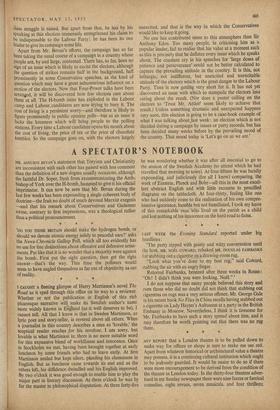I CAUGHT A fleeting glimpse of Harry Martinson's novel The
Road as it sped through this office on its way to a reviewer. Whether or not the publication in English of this rich picaresque narrative will make its Swedish author's name More widely known in England (as it well deserves to be), I cannot tell. All that I know is that in Sweden Martinson, as lyric poet and story-teller, is revered above all others. When a journalist in this country describes a man as 'lovable,' the sceptical reader reaches for his revolver. I am sorry, but lovable is what Martinson is: there is no more suitable word for this expansive blend of worldliness and innocence. Once in Stockholm we met, having been brought together at early luncheon by some friends who had to leave early. At first Martinson smiled but kept silent, pleading his clumsiness in English. But as luncheon came towards its end and as the others left, his diffidence dwindled and his. English improved. By two o'clock it was good enough to enable him to play the major part in literary discussion. At three o'clock he was by far the master in philosophical disputation. At three forty-five he was wondering whether it was after all essential to go to the session of the Swedish Academy (to attend which he had travelled that morning to town). At four-fifteen he was lucidly expounding, and judiciously (for all I knew) comparing, the work of Einstein, Planck and Bohr—all this in the most excel- lent abstract English and with little recourse to pencilled diagrams on the tablecloth. At four-thirty, feeling like one who had suddenly come to the realisation of his own compre- hensive ignorance, humble but not humiliated, I took my leave of this remarkable man who lived on the parish as a child and lost nothing of his innocence on the hard road to fame.


































 Previous page
Previous page